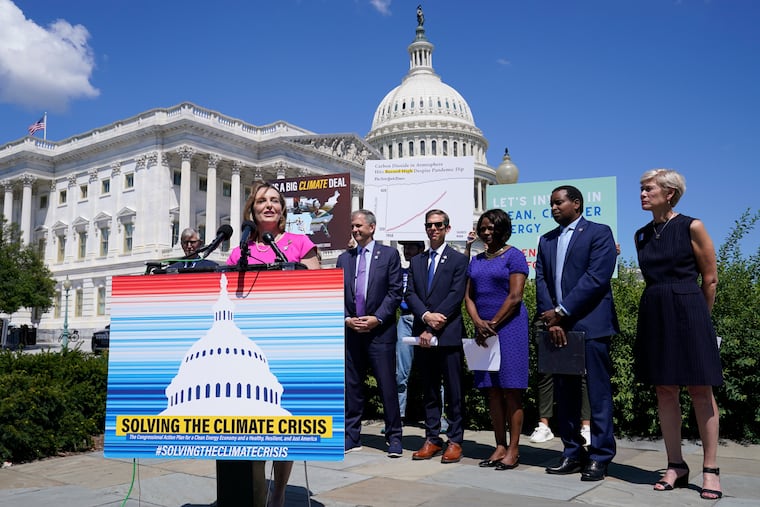I’m a teen worried about climate. The inflation bill doesn’t do enough, but it’s a start.
Completely fighting off fossil fuel projects is the only way to completely transition into a green future.

When I first learned about climate change, it wasn’t from textbooks or world leaders. It was from a teenager.
I was in sixth grade, sitting in my middle school classroom watching Greta Thunberg deliver her speech at the U.N. Climate Summit. Living in suburban New Jersey meant that I was fortunate to never feel threatened by the effects of climate change in my community. However, Thurnberg’s words were enough to pierce through my bubble of blissful ignorance: “We are at the beginning of mass extinction and all you can talk about is money and fairy tales of eternal economic growth? How dare you.”
Watching this blurry YouTube video back in 2019 was what led me to start closely tracking the conversation around climate change and policy. Alongside peers across the country, I participated in Fridays for the Future and climate strikes, attended protests that advocated for a variety of different solutions, posted climate infographics all over social media, and did my part to speak with anyone and everyone I could about the dangers of climate change. However, as helpful as activism was in informing those around me about this issue, it became increasingly apparent that the only way real change could happen is through policy.
When I first heard about the Inflation Reduction Act, I was skeptical. After all, it seemed very similar to the 2021 “Build Back Better” bill, which was unable to pass and took away much hope for any future substantial climate legislation. However, on Tuesday, President Joe Biden was able to sign the Inflation Reduction Act into law, fulfilling a portion of his domestic agenda. The package makes big changes to parts of the U.S. economy, investing almost $370 billion in energy and climate industries, putting minimum taxes on big corporations, and limiting the prices of prescription drugs. The bill is also predicted to slow inflation by lowering the federal deficit.
To me, this bill was a victory, not just for the potential impact it can make, but also because it represents a shift in the thinking of lawmakers. Climate change is a problem and needs to be prioritized as such. The Inflation Reduction Act moves past historical denial, delay tactics, and economic models to put climate change at the forefront of the agenda and, against the odds, to finally take real action.
This is a win that could be attributed to the work of scientists, lawmakers, politicians, and older activists, but also, notably, the youth climate movement.
Teen activists have spent years asking older generations to prioritize climate change as a pressing issue. The Inflation Reduction Act is a step in the right direction in that it marks an investment in clean energy incentives. While celebrating its passage is entirely OK, the work that has to be done is far from over, and Democrats shouldn’t be patting themselves on the back for this bill. It is clear that there were compromises, and the budget allocated is just a fraction of what was originally proposed. More concerning is that the bill encourages both renewable energy and the fossil fuel industry. This is simply not sustainable. Completely fighting off fossil fuel projects is the only way to fully transition into a green future.
“Teen activists have spent years asking older generations to prioritize climate change as a pressing issue.”
To eliminate emissions by 2050, Congress would have to phase out fossil fuel pollution. This is a lot to accomplish in a short amount of time, and the Inflation Reduction Act (which only passed by a slim margin, with strong Republican opposition) just scratches the surface of politically difficult legislation we must pass over the next few years.
» READ MORE: To get action on climate change, change the subject
Every Earth Day for as long as I can remember, my friends and I participate in activities where we can appreciate the beauty of the Earth. While this started off as a fun tradition, over the last few years it’s become impossible to ignore the countdown to climate calamity. Each Intergovernmental Panel on Climate Change (IPCC) report I read confirms that the disaster happening around us is very much a real problem and that it requires action in the form of systematic changes. Watching the struggles with global climate agreements and negotiations over the past few years made me realize that it was time for the U.S. to become a leader in the fight against climate change.
According to a recent study in the journal Science, “children being born now will experience extreme climate events at a rate that is up to seven times higher than people born in 1960.″ I refuse to believe that the duty of elected officials in protecting the future stops here. This is the reason why activists like myself will always be here, reminding our administration of the importance of accountability.
Sriya Tallapragada is a high school student at the Pingry School in Basking Ridge, N.J.